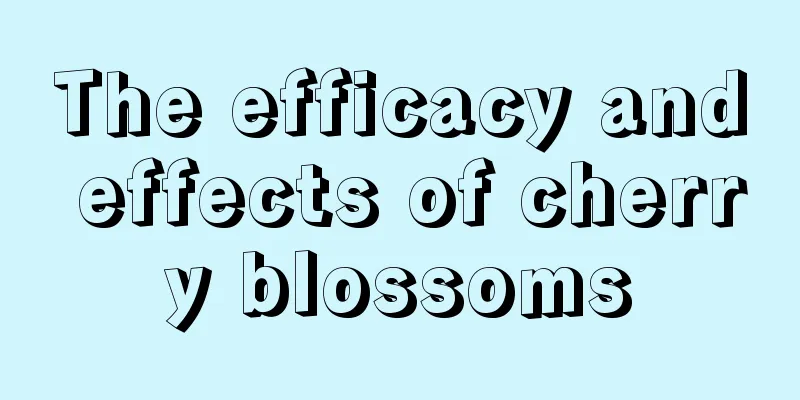The efficacy and effects of cherry blossoms

Ornamental valueCherry blossoms grow luxuriantly, with luxuriant branches and leaves and bright and colorful flowers. They are a very high-quality ornamental plant in gardens, so cherry blossoms are often planted in groups or individually in gardens along roadsides, in courtyards, in front of buildings, etc. Cherry blossoms can also be made into bonsai and placed in the bedroom to beautify the space and cultivate sentiment. Medicinal valueThe leaves and petals of cherry blossoms are a kind of traditional Chinese medicinal material. According to identification, cherry bark contains gentisic acid 5-glucoside and 5-rhamnosyl glucoside (Sakurarin), prunin, and wood contains d-catechins and other medicinal substances. Its function is to relieve cough, sober up, and can also treat symptoms such as fever. In addition, cherry blossom petals contain a large amount of vitamins A and B, cherry leaf enzymes and other nutritious substances, so cherry blossoms are also used to beautify the skin and make health care products. Cherry blossoms can shrink pores, control oil, and are suitable for facial skin care. This is because the essence in cherry blossoms can be extracted and used to make cherry blossom oil. Cherry blossom oil contains cherry blossom enzymes, and this enzyme can remove acne on the face, so cherry blossoms are also used to remove acne. Edible effectCherry blossom leaves can be made into dried salted cherry leaves, which can be used to make tea, or added to shower gel. Dried salted cherry leaves can also be added to food to make edible foods with high nutritional value, which can keep the stomach healthy. Moreover, cherry blossom is a kind of flower that Japanese people love very much. They regard it as their national flower. When cherry blossoms are in full bloom, they are always made into snacks or cherry blossom wine. It can be seen that cherry blossoms can be used for medicinal purposes as well as edible, and have many uses! |
<<: Is Mirabilis jasminoides poisonous?
>>: The flower language and cultural background of black orchid
Recommend
How can a gardener water flowers like this? The flowers are growing more and more prosperous, you will be at a loss if you don’t look at them!
If you water it like this, the flower will die an...
Why are the leaves of Chlorophytum comosum becoming soft?
The reason why the leaves of Chlorophytum comosum...
Cultivation methods and precautions of island gardenia
Island gardenia is a very beautiful flower plant ...
How do lotuses survive the winter? Will they die in the winter?
1. How to survive the winter 1. Cut off the yello...
How to raise a quiet night
1. Soil When breeding, you need to use soil that ...
Can osmanthus trees be grown outdoors in the north? What are the cultivation methods and precautions for outdoor cultivation in the north?
1. Breeding methods 1. Temperature: It is cold-re...
The reason why your flowers have yellowing leaves and are falling off but cannot grow is that the roots are not well maintained!
1. Orchid A common problem with orchids is that t...
Is it better to grow precious bamboo in water or soil?
Is it better to grow precious bamboo in water or ...
How to propagate passion fruit and what to pay attention to
Passion fruit reproduction method There are two m...
What is the best season to plant kiwifruit?
Kiwi fruit planting time The best time to plant k...
What are the cultivation methods and precautions of chrysanthemum
Chrysanthemum Introduction Chrysanthemum is a pla...
Methods and precautions for cultivating bromeliads at home
1. Temperature It prefers a warm environment. It ...
These flowers keep dying, they keep dying, I'm getting desperate...
Fuchsia 1. Water when the soil is dry. Wait until...
Where are the best places to grow sugar apples?
Introduction to Custard Apple Sugar apple, also k...
How to grow the fragrant vine so that it blooms
Flowering time of safflower The fragrant vine usu...









